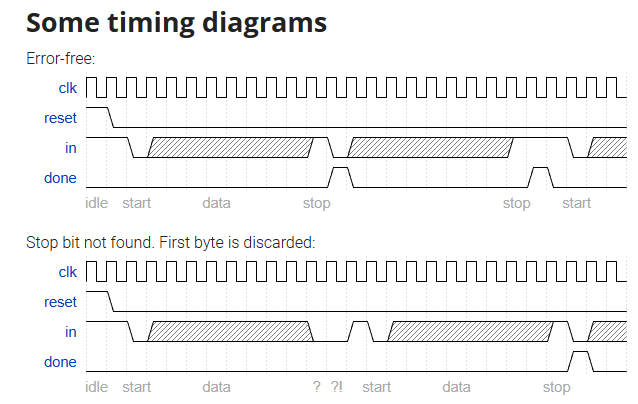- 【LeetCode 热题 100】24. 两两交换链表中的节点——(解法一)迭代+哨兵
xumistore
LeetCodeleetcode链表算法java
Problem:24.两两交换链表中的节点题目:给你一个链表,两两交换其中相邻的节点,并返回交换后链表的头节点。你必须在不修改节点内部的值的情况下完成本题(即,只能进行节点交换)。文章目录整体思路完整代码时空复杂度时间复杂度:O(N)空间复杂度:O(1)整体思路这段代码旨在解决一个经典的链表操作问题:两两交换链表中的节点(SwapNodesinPairs)。问题要求将链表中每两个相邻的节点进行交换
- Leetcode 148. 排序链表
文章目录前引题目代码(首刷看题解)代码(8.9二刷部分看解析)代码(9.15三刷部分看解析)前引综合性比较强的一道题,要求时间复杂度必须O(logn)才能通过,最适合链表的排序算法就是归并。这里采用自顶向下的方法步骤:找到链表中点(双指针)对两个子链表排序(递归,直到只有一个结点,记得将子链表最后指向nullptr)归并(引入dummy结点)题目Leetcode148.排序链表代码(首刷看题解)c
- LeetCode 148. 排序链表:归并排序的细节解析
进击的小白菜
2025Top100详解leetcode链表算法
文章目录题目描述一、方法思路:归并排序的核心步骤二、关键实现细节:快慢指针分割链表1.快慢指针的初始化问题2.为什么选择`fast=head.next`?示例1:链表长度为偶数(`1->2->3->4`)三、完整代码实现四、复杂度分析五、总结题目描述LeetCode148题要求对链表进行排序,时间复杂度需为O(nlogn),且空间复杂度为O(logn)。由于链表的特殊结构(无法随机访问),归并排序
- FPGA小白到项目实战:Verilog+Vivado全流程通关指南(附光学类岗位技能映射)
阿牛的药铺
算法移植部署fpga开发verilog
FPGA小白到项目实战:Verilog+Vivado全流程通关指南(附光学类岗位技能映射)引言:为什么这个FPGA入门路线能帮你快速上岗?本文设计了一条**"Verilog语法→工具链操作→光学项目实战→岗位技能对标"的阶梯式学习路径。不同于泛泛而谈的FPGA教程,我们聚焦光学类产品开发**核心能力(时序接口设计、图像处理算法移植、高速接口应用),通过3个递进式项目(从LED闪烁到图像边缘检测),
- ARM嵌入式可编程控制器技术开发
拉勾科研工作室
arm开发
PLC自动化设计|毕业设计指导|工业自动化解决方案✨专业领域:PLC程序设计与调试工业自动化控制系统HMI人机界面开发工业传感器应用电气控制系统设计工业网络通信擅长工具:西门子S7系列PLC编程三菱/欧姆龙PLC应用触摸屏界面设计电气CAD制图工业现场总线技术自动化设备调试主要内容:PLC控制系统设计工业自动化方案规划电气原理图绘制控制程序编写与调试毕业论文指导毕业设计题目与程序设计✅具体问题可以
- LeetCode算法题:电话号码的字母组合
吱屋猪_
算法leetcodejava
题目描述:给定一个仅包含数字2-9的字符串,返回所有它能表示的字母组合。答案可以按任意顺序返回。给出数字到字母的映射如下(与电话按键相同)。注意1不对应任何字母。2->"abc"3->"def"4->"ghi"5->"jkl"6->"mno"7->"pqrs"8->"tuv"9->"wxyz"例如,给定digits="23",返回["ad","ae","af","bd","be","bf","cd
- Leetcode 3604. Minimum Time to Reach Destination in Directed Graph
Espresso Macchiato
leetcode笔记leetcode3604leetcodemediumleetcode双周赛160BFS广度优先遍历最优路径
Leetcode3604.MinimumTimetoReachDestinationinDirectedGraph1.解题思路2.代码实现题目链接:3604.MinimumTimetoReachDestinationinDirectedGraph1.解题思路这一题思路上就是一个广度优先遍历,我们不断考察当前时间点以及位置的情况下,下一个点可行的位置,然后考察最近的时间点能够到达的位置,遍历全部可能
- 【GESP】C++三级真题 luogu-B4359 [GESP202506 三级] 分糖果
CoderCodingNo
GESPc++java开发语言
GESPC++三级,2025年6月真题,模拟算法,难度★★☆☆☆。本次三级题目个人感觉比较简单。题目题解详见:【GESP】C++三级真题luogu-B4359[GESP202506三级]分糖果|OneCoder【GESP】C++三级真题luogu-B4359[GESP202506三级]分糖果|OneCoderGESPC++三级,2025年6月真题,模拟算法,难度★★☆☆☆。本次三级题目个人感觉比较
- 2025年渗透测试面试题总结-2025年HW(护网面试) 43(题目+回答)
独行soc
2025年护网面试职场和发展linux科技渗透测试安全护网
安全领域各种资源,学习文档,以及工具分享、前沿信息分享、POC、EXP分享。不定期分享各种好玩的项目及好用的工具,欢迎关注。目录2025年HW(护网面试)431.自我介绍与职业规划2.Webshell源码级检测方案3.2025年新型Web漏洞TOP54.渗透中的高价值攻击点5.智能Fuzz平台架构设计6.堆栈溢出攻防演进7.插桩技术实战应用8.二进制安全能力矩阵9.C语言内存管理精要10.Pyth
- 蓝桥杯2023年第十四届省赛真题-岛屿个数
撰卢
蓝桥杯算法职场和发展
目录题目题目描述输入格式输出格式样例输入样例输出思路:两次DFS(染色法+合并)-Dotcpp编程社区代码:题目题目描述小蓝得到了一副大小为M×N的格子地图,可以将其视作一个只包含字符‘0’(代表海水)和‘1’(代表陆地)的二维数组,地图之外可以视作全部是海水,每个岛屿由在上/下/左/右四个方向上相邻的‘1’相连接而形成。在岛屿A所占据的格子中,如果可以从中选出k个不同的格子,使得他们的坐标能够组
- FPGA 设计中的 “Create HDL Wrapper“ 和 “Generating Output Products“ 的区别
行者..................
fpga开发
CreateHDLWrapper(创建HDL包装器)目的:为顶层设计模块(通常是BlockDesign/IPIntegrator设计)创建一个HDL包装文件功能:将图形化/框图设计的BlockDesign转换为可综合的HDL代码(Verilog或VHDL)创建一个顶层模块,将所有IP核和连接实例化使用场景:当使用IPIntegrator创建BlockDesign后需要将图形化设计转换为HDL代码以
- 优化版三国主题MySQL建表与查询练习(细节增强)
韩公子的Linux大集市
五MySQL运维DBAmysql数据库
文章目录优化版三国主题MySQL建表与查询练习(细节增强)题目一:三国人物信息表(全面优化)建表语句(增强约束与注释)插入数据(含完整信息)查询练习(增强实用性)题目二:三国战役表(增强关系设计)建表语句(完整关系模型)插入数据(完整战役信息)查询练习(多表关联)综合实战演练1.人物能力值分析2.战役地图查询3.胜负因素分析设计亮点总结优化版三国主题MySQL建表与查询练习(细节增强)题目一:三国
- LeetCode第317题_离建筑物最近的距离
@蓝莓果粒茶
算法leetcodelinux算法c#学习pythonc++
LeetCode第317题:离建筑物最近的距离文章摘要本文详细解析LeetCode第317题"离建筑物最近的距离",这是一道图论和广度优先搜索的问题。文章提供了基于多源BFS的解法,包含C#、Python、C++三种语言实现,配有详细的算法分析和性能对比。适合想要提升图论算法能力的程序员。核心知识点:广度优先搜索、图论、矩阵遍历难度等级:困难推荐人群:具有图论基础,想要提升算法能力的程序员题目描述
- 学生数据的输入输出
一粒沙白兔
C语言刷题记录数据结构c语言算法
题目描述编写input()和output()函数输入,输出5个学生的数据记录。程序分析:运用结构体定义学生数据类型,包含姓名、性别、年龄等成员。通过自定义函数input利用循环配合scanf函数接收5个学生的相关数据,存储到结构体数组中;再用自定义函数output,通过循环将结构体数组中存储的学生数据输出。源代码#include#includetypedefstruct{charname[20];
- 村村通--洛谷(并查集的运用)
P1536村村通题目描述某市调查城镇交通状况,得到现有城镇道路统计表。表中列出了每条道路直接连通的城镇。市政府“村村通工程”的目标是使全市任何两个城镇间都可以实现交通(但不一定有直接的道路相连,只要相互之间可达即可)。请你计算出最少还需要建设多少条道路?输入格式输入包含若干组测试测试数据,每组测试数据的第一行给出两个用空格隔开的正整数,分别是城镇数目n和道路数目m;随后的m行对应m条道路,每行给出
- 傅里叶级数分解问题
题目问题1.在区间[−l,l][-l,l][−l,l]上分解为完整傅里叶级数:(a)ezxe^{zx}ezx,其中z∈Cz\in\mathbb{C}z∈C;找出zzz的“例外”值;(b)cos(ωx)\cos(\omegax)cos(ωx),sin(ωx)\sin(\omegax)sin(ωx),其中00(\etal)^2+(n\pi)^2>0(ηl)2+(nπ)2>0对所有n≥1n\geq1
- 傅里叶方法求解正方形偏微分方程
weixin_30777913
算法
题目问题10.使用傅里叶方法在正方形中找到以下问题的所有解:4uxx−8uyy=0,00\lambda>0λ>0:设λ=μ2\lambda=\mu^2λ=μ2(μ>0\mu>0μ>0),则X′′+μ2X=0X''+\mu^2X=0X′′+μ2X=0,解为X=Acos(μx)+Bsin(μx)X=A\cos(\mux)+B\sin(\mux)X=Acos(μx)+Bsin(μx)。X′=−Aμs
- 超越RAG的搜索革命!分层框架让AI像专家团队一样深度思考
Python_金钱豹
人工智能深度学习网络知识图谱大数据
❝一句话概括:与其训练一个越来越大的“六边形战士”AI,不如组建一个各有所长的“复仇者联盟”,这篇论文就是那本“联盟组建手册”。(原论文题目见文末,点击阅读原文可直接跳转至原文链接,Publishedonarxivon03Jul2025,byRenminUniversityofChina)*第一阶段:核心思想概览**论文的动机*在面对“未来的家庭娱乐会是什么样?”或“结合最新的财报和市场趋势,分析
- 每日一题3239.最少翻转次数使二进制矩阵回文;
本题出自LeetCode每日一题3239.最少翻转次数使二进制矩阵回文,初看想着就是一道暴力破解,双指针强硬遍历一横一竖题目给你一个mxn的二进制矩阵grid。如果矩阵中一行或者一列从前往后与从后往前读是一样的,那么我们称这一行或者这一列是回文的。你可以将grid中任意格子的值翻转,也就是将格子里的值从0变成1,或者从1变成0。请你返回最少翻转次数,使得矩阵要么所有行是回文的,要么所有列是回文的。
- 【OD机试题解法笔记】根据IP查找城市
xuwzen
编码训练笔记tcp/ipjava
题目描述某业务需要根据终端的IP地址获取该终端归属的城市,可以根据公开的IP地址池信息查询归属城市。地址池格式如下:城市名=起始IP,结束IP起始和结束地址按照英文逗号分隔,多个地址段采用英文分号分隔。比如:City1=1.1.1.1,1.1.1.2;City1=1.1.1.11,1.1.1.16;City2=3.3.3.3,4.4.4.4;City3=2.2.2.2,6.6.6.6一个城市可以有
- 【OD机试题解法笔记】分月饼
xuwzen
编码训练笔记算法
题目描述中秋节,公司分月饼,m个员工,买了n个月饼,m≤n,每个员工至少分1个月饼,但可以分多个,单人分到最多月饼的个数是Max1,单人分到第二多月饼个数是Max2,Max1-Max2≤3,单人分到第n-1多月饼个数是Max(n-1),单人分到第n多月饼个数是Max(n),Max(n-1)–Max(n)≤3,问有多少种分月饼的方法?输入描述每一行输入mn,表示m个员工,n个月饼,m≤n输出描述输出
- 数据库练习题
EmorZhong
我的MySQL数据库mysql算法
MySQL练习https://github.com/EmorZz1G/DatabaseStudy在GitHub中查看更多题目理解有点离谱,多个题目更新查询平均成绩大于80的学生姓名。查询课程成绩大于课程平均成绩的选课信息,显示学生姓名、课程名称和成绩。查询至少选修了C1和C2课程的学生名单。查询选修了C1课程而没有选修C2课程的学生名单。统计每门课程成绩大于80分的学生数。统计计算机系“CS”学生
- 2025秋招优秀项目推荐
微凉的衣柜
人工智能深度学习算法gpt
01.多个优异的数据结构与算法项目推荐良心推荐hello-algo包含多个通用的代码框架,一个框架完成多道题目,更详细请查阅labuladong02.大模型岗位面试总结:共24家,9个offer大模型岗位面试总结:共24家,9个offer03.视觉检测分割一切源码及在线DemoGrounded-Segment-Anything项目源码
- 什么样的字段适合加索引?索引失效了解吗?
什么样的字段适合加索引?索引失效了解吗?题目什么样的字段适合加索引?索引失效了解吗?推荐解析适合加索引的场景1)主键字段:用于唯一标识每个记录的字段,通常是数据库表中的一个自增或唯一标识字段。2)外键字段:用于连接两个表之间关系的字段,通常是一个表中的字段与另一个表中的主键字段关联。3)经常用于查询的字段:如果某个字段经常被用于查询条件,例如用户的用户名、邮箱或订单的编号,那么为该字段添加索引可以
- 前端面试Javascript手撕题目回顾
在前端面试中,“手撕代码”环节是考察候选人编程能力和思维逻辑的重要部分。以下是一些常见的手撕代码题目及详细解答:1.实现数组扁平化(FlattenArray)将多维数组转换为一维数组。方法一:递归functionflatten(arr){constresult=[];arr.forEach(item=>{if(Array.isArray(item)){result.push(...flatten(
- 力扣-206.反转链表
এ᭄画画的北北
java二刷力扣hot100leetcode链表算法
题目链接206.反转链表publicclassListNode{intval;ListNodenext;ListNode(){}ListNode(intval){this.val=val;}ListNode(intval,ListNodenext){this.val=val;this.next=next;}classSolution{publicListNodereverseList(ListNo
- 排序题目:插入区间
伟大的车尔尼
数据结构和算法#排序排序
文章目录题目标题和出处难度题目描述要求示例数据范围解法一思路和算法代码复杂度分析解法二思路和算法代码复杂度分析题目标题和出处标题:插入区间出处:57.插入区间难度5级题目描述要求给定无重叠的区间数组intervals\texttt{intervals}intervals,其中intervals[i]=[starti,endi]\texttt{intervals[i]=[start}_\texttt
- 力扣-73题 矩阵置零(C++)
JIngles123
#中等题
题目链接:https://leetcode-cn.com/problems/set-matrix-zeroes/题目如下:classSolution{public:voidsetZeroes(vector>&matrix){introw=matrix.size();intcol=matrix[0].size();vectorpos;//x0,y0,x1,y1,x2,y2...//通过一维数组的方式
- 前缀和题目:有序数组中差绝对值之和
伟大的车尔尼
数据结构和算法#前缀和前缀和
文章目录题目标题和出处难度题目描述要求示例数据范围解法思路和算法代码复杂度分析题目标题和出处标题:有序数组中差绝对值之和出处:1685.有序数组中差绝对值之和难度6级题目描述要求给定一个非递减有序整数数组nums\texttt{nums}nums。建立并返回一个整数数组result\texttt{result}result,要求和nums\texttt{nums}nums长度相同,且result[
- 牛客周赛 Round 56
洋洋的计算机刷题日记
牛客竞赛网比赛刷题算法
牛客周赛Round56A面包店故事链接:https://ac.nowcoder.com/acm/contest/88392/A来源:牛客网题目描述小镇上有一家面包店,面包以元的价格出售,加元可以多加几块培根。小歪带着元来到了面包店,他想知道自己能不能买到加培根的面包?输入描述:在一行上输入三个整数,,(1≤,,≤100)代表面包的价格、培根的价格和小歪带的钱。输出描述:如果小歪能加到培根,在一行上
- 插入表主键冲突做更新
a-john
有以下场景:
用户下了一个订单,订单内的内容较多,且来自多表,首次下单的时候,内容可能会不全(部分内容不是必须,出现有些表根本就没有没有该订单的值)。在以后更改订单时,有些内容会更改,有些内容会新增。
问题:
如果在sql语句中执行update操作,在没有数据的表中会出错。如果在逻辑代码中先做查询,查询结果有做更新,没有做插入,这样会将代码复杂化。
解决:
mysql中提供了一个sql语
- Android xml资源文件中@、@android:type、@*、?、@+含义和区别
Cb123456
@+@?@*
一.@代表引用资源
1.引用自定义资源。格式:@[package:]type/name
android:text="@string/hello"
2.引用系统资源。格式:@android:type/name
android:textColor="@android:color/opaque_red"
- 数据结构的基本介绍
天子之骄
数据结构散列表树、图线性结构价格标签
数据结构的基本介绍
数据结构就是数据的组织形式,用一种提前设计好的框架去存取数据,以便更方便,高效的对数据进行增删查改。正确选择合适的数据结构,对软件程序的高效执行的影响作用不亚于算法的设计。此外,在计算机系统中数据结构的作用也是非同小可。例如常常在编程语言中听到的栈,堆等,就是经典的数据结构。
经典的数据结构大致如下:
一:线性数据结构
(1):列表
a
- 通过二维码开放平台的API快速生成二维码
一炮送你回车库
api
现在很多网站都有通过扫二维码用手机连接的功能,联图网(http://www.liantu.com/pingtai/)的二维码开放平台开放了一个生成二维码图片的Api,挺方便使用的。闲着无聊,写了个前台快速生成二维码的方法。
html代码如下:(二维码将生成在这div下)
? 1
&nbs
- ImageIO读取一张图片改变大小
3213213333332132
javaIOimageBufferedImage
package com.demo;
import java.awt.image.BufferedImage;
import java.io.File;
import java.io.IOException;
import javax.imageio.ImageIO;
/**
* @Description 读取一张图片改变大小
* @author FuJianyon
- myeclipse集成svn(一针见血)
7454103
eclipseSVNMyEclipse
&n
- 装箱与拆箱----autoboxing和unboxing
darkranger
J2SE
4.2 自动装箱和拆箱
基本数据(Primitive)类型的自动装箱(autoboxing)、拆箱(unboxing)是自J2SE 5.0开始提供的功能。虽然为您打包基本数据类型提供了方便,但提供方便的同时表示隐藏了细节,建议在能够区分基本数据类型与对象的差别时再使用。
4.2.1 autoboxing和unboxing
在Java中,所有要处理的东西几乎都是对象(Object)
- ajax传统的方式制作ajax
aijuans
Ajax
//这是前台的代码
<%@ page language="java" import="java.util.*" pageEncoding="UTF-8"%> <% String path = request.getContextPath(); String basePath = request.getScheme()+
- 只用jre的eclipse是怎么编译java源文件的?
avords
javaeclipsejdktomcat
eclipse只需要jre就可以运行开发java程序了,也能自动 编译java源代码,但是jre不是java的运行环境么,难道jre中也带有编译工具? 还是eclipse自己实现的?谁能给解释一下呢问题补充:假设系统中没有安装jdk or jre,只在eclipse的目录中有一个jre,那么eclipse会采用该jre,问题是eclipse照样可以编译java源文件,为什么呢?
&nb
- 前端模块化
bee1314
模块化
背景: 前端JavaScript模块化,其实已经不是什么新鲜事了。但是很多的项目还没有真正的使用起来,还处于刀耕火种的野蛮生长阶段。 JavaScript一直缺乏有效的包管理机制,造成了大量的全局变量,大量的方法冲突。我们多么渴望有天能像Java(import),Python (import),Ruby(require)那样写代码。在没有包管理机制的年代,我们是怎么避免所
- 处理百万级以上的数据处理
bijian1013
oraclesql数据库大数据查询
一.处理百万级以上的数据提高查询速度的方法: 1.应尽量避免在 where 子句中使用!=或<>操作符,否则将引擎放弃使用索引而进行全表扫描。
2.对查询进行优化,应尽量避免全表扫描,首先应考虑在 where 及 o
- mac 卸载 java 1.7 或更高版本
征客丶
javaOS
卸载 java 1.7 或更高
sudo rm -rf /Library/Internet\ Plug-Ins/JavaAppletPlugin.plugin
成功执行此命令后,还可以执行 java 与 javac 命令
sudo rm -rf /Library/PreferencePanes/JavaControlPanel.prefPane
成功执行此命令后,还可以执行 java
- 【Spark六十一】Spark Streaming结合Flume、Kafka进行日志分析
bit1129
Stream
第一步,Flume和Kakfa对接,Flume抓取日志,写到Kafka中
第二部,Spark Streaming读取Kafka中的数据,进行实时分析
本文首先使用Kakfa自带的消息处理(脚本)来获取消息,走通Flume和Kafka的对接 1. Flume配置
1. 下载Flume和Kafka集成的插件,下载地址:https://github.com/beyondj2ee/f
- Erlang vs TNSDL
bookjovi
erlang
TNSDL是Nokia内部用于开发电信交换软件的私有语言,是在SDL语言的基础上加以修改而成,TNSDL需翻译成C语言得以编译执行,TNSDL语言中实现了异步并行的特点,当然要完整实现异步并行还需要运行时动态库的支持,异步并行类似于Erlang的process(轻量级进程),TNSDL中则称之为hand,Erlang是基于vm(beam)开发,
- 非常希望有一个预防疲劳的java软件, 预防过劳死和眼睛疲劳,大家一起努力搞一个
ljy325
企业应用
非常希望有一个预防疲劳的java软件,我看新闻和网站,国防科技大学的科学家累死了,太疲劳,老是加班,不休息,经常吃药,吃药根本就没用,根本原因是疲劳过度。我以前做java,那会公司垃圾,老想赶快学习到东西跳槽离开,搞得超负荷,不明理。深圳做软件开发经常累死人,总有不明理的人,有个软件提醒限制很好,可以挽救很多人的生命。
相关新闻:
(1)IT行业成五大疾病重灾区:过劳死平均37.9岁
- 读《研磨设计模式》-代码笔记-原型模式
bylijinnan
java设计模式
声明: 本文只为方便我个人查阅和理解,详细的分析以及源代码请移步 原作者的博客http://chjavach.iteye.com/
/**
* Effective Java 建议使用copy constructor or copy factory来代替clone()方法:
* 1.public Product copy(Product p){}
* 2.publi
- 配置管理---svn工具之权限配置
chenyu19891124
SVN
今天花了大半天的功夫,终于弄懂svn权限配置。下面是今天收获的战绩。
安装完svn后就是在svn中建立版本库,比如我本地的是版本库路径是C:\Repositories\pepos。pepos是我的版本库。在pepos的目录结构
pepos
component
webapps
在conf里面的auth里赋予的权限配置为
[groups]
- 浅谈程序员的数学修养
comsci
设计模式编程算法面试招聘
浅谈程序员的数学修养
- 批量执行 bulk collect与forall用法
daizj
oraclesqlbulk collectforall
BULK COLLECT 子句会批量检索结果,即一次性将结果集绑定到一个集合变量中,并从SQL引擎发送到PL/SQL引擎。通常可以在SELECT INTO、
FETCH INTO以及RETURNING INTO子句中使用BULK COLLECT。本文将逐一描述BULK COLLECT在这几种情形下的用法。
有关FORALL语句的用法请参考:批量SQL之 F
- Linux下使用rsync最快速删除海量文件的方法
dongwei_6688
OS
1、先安装rsync:yum install rsync
2、建立一个空的文件夹:mkdir /tmp/test
3、用rsync删除目标目录:rsync --delete-before -a -H -v --progress --stats /tmp/test/ log/这样我们要删除的log目录就会被清空了,删除的速度会非常快。rsync实际上用的是替换原理,处理数十万个文件也是秒删。
- Yii CModel中rules验证规格
dcj3sjt126com
rulesyiivalidate
Yii cValidator主要用法分析:
yii验证rulesit 分类: Yii yii的rules验证 cValidator主要属性 attributes ,builtInValidators,enableClientValidation,message,on,safe,skipOnError
- 基于vagrant的redis主从实验
dcj3sjt126com
vagrant
平台: Mac
工具: Vagrant
系统: Centos6.5
实验目的: Redis主从
实现思路
制作一个基于sentos6.5, 已经安装好reids的box, 添加一个脚本配置从机, 然后作为后面主机从机的基础box
制作sentos6.5+redis的box
mkdir vagrant_redis
cd vagrant_
- Memcached(二)、Centos安装Memcached服务器
frank1234
centosmemcached
一、安装gcc
rpm和yum安装memcached服务器连接没有找到,所以我使用的是make的方式安装,由于make依赖于gcc,所以要先安装gcc
开始安装,命令如下,[color=red][b]顺序一定不能出错[/b][/color]:
建议可以先切换到root用户,不然可能会遇到权限问题:su root 输入密码......
rpm -ivh kernel-head
- Remove Duplicates from Sorted List
hcx2013
remove
Given a sorted linked list, delete all duplicates such that each element appear only once.
For example,Given 1->1->2, return 1->2.Given 1->1->2->3->3, return&
- Spring4新特性——JSR310日期时间API的支持
jinnianshilongnian
spring4
Spring4新特性——泛型限定式依赖注入
Spring4新特性——核心容器的其他改进
Spring4新特性——Web开发的增强
Spring4新特性——集成Bean Validation 1.1(JSR-349)到SpringMVC
Spring4新特性——Groovy Bean定义DSL
Spring4新特性——更好的Java泛型操作API
Spring4新
- 浅谈enum与单例设计模式
247687009
java单例
在JDK1.5之前的单例实现方式有两种(懒汉式和饿汉式并无设计上的区别故看做一种),两者同是私有构
造器,导出静态成员变量,以便调用者访问。
第一种
package singleton;
public class Singleton {
//导出全局成员
public final static Singleton INSTANCE = new S
- 使用switch条件语句需要注意的几点
openwrt
cbreakswitch
1. 当满足条件的case中没有break,程序将依次执行其后的每种条件(包括default)直到遇到break跳出
int main()
{
int n = 1;
switch(n) {
case 1:
printf("--1--\n");
default:
printf("defa
- 配置Spring Mybatis JUnit测试环境的应用上下文
schnell18
springmybatisJUnit
Spring-test模块中的应用上下文和web及spring boot的有很大差异。主要试下来差异有:
单元测试的app context不支持从外部properties文件注入属性
@Value注解不能解析带通配符的路径字符串
解决第一个问题可以配置一个PropertyPlaceholderConfigurer的bean。
第二个问题的具体实例是:
- Java 定时任务总结一
tuoni
javaspringtimerquartztimertask
Java定时任务总结 一.从技术上分类大概分为以下三种方式: 1.Java自带的java.util.Timer类,这个类允许你调度一个java.util.TimerTask任务; 说明: java.util.Timer定时器,实际上是个线程,定时执行TimerTask类 &
- 一种防止用户生成内容站点出现商业广告以及非法有害等垃圾信息的方法
yangshangchuan
rank相似度计算文本相似度词袋模型余弦相似度
本文描述了一种在ITEYE博客频道上面出现的新型的商业广告形式及其应对方法,对于其他的用户生成内容站点类型也具有同样的适用性。
最近在ITEYE博客频道上面出现了一种新型的商业广告形式,方法如下:
1、注册多个账号(一般10个以上)。
2、从多个账号中选择一个账号,发表1-2篇博文
